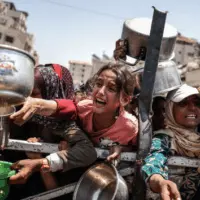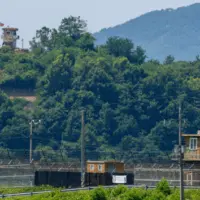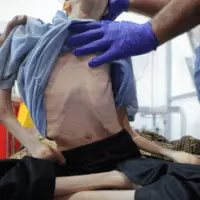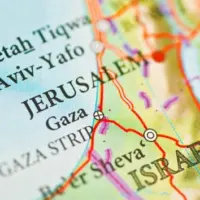
(LONDON) — Hospitals in the Gaza Strip recorded five deaths over the past 24 hours due to malnutrition, the Gaza Ministry of Health in the Hamas-run territory said on Monday.
All of those who died from malnutrition in the past 24 hours were adults, according to the ministry.
The deaths bring the total number of people who have died due to hunger since the conflict began nearly two years ago to 180 people, including 93 children, the ministry said.
Israel is under increasing international pressure to facilitate the entry of more aid into Gaza, which has been devastated by nearly two years of conflict between the Israel Defense Forces (IDF) and Palestinian militant groups, chief among them Hamas, which is designated as a terrorist organization by the U.S. and the European Union.
U.K. Prime Minister Keir Starmer said last week that his nation will recognize a Palestinian state at a United Nations meeting in September if Israel does not agree to a ceasefire in Gaza. It came after French President Emmanuel Macron said France would acknowledge Palestine as a state, regardless of a ceasefire, at the same September meeting.
Aid is slowly resuming entry into Gaza after Israel instituted an 11-week total blockade on all humanitarian supplies entering the strip earlier this year.
The blockade caused widespread malnutrition and conditions that could likely lead to famine, according to the U.N. and aid groups at the time. Israeli officials have long accused Hamas of stealing and reselling aid, which Hamas denies.
In an post to X last week, Israel said it has been working “around the clock to get food, medicine, and essentials into Gaza.” However, the U.N. World Food Programme told ABC last week that only about half of its requested 100 trucks have been allowed into Gaza by Israel.
Last week, ABC News’ Ian Pannell visited an aid station in Gaza that had stacks of undelivered food. An IDF spokesperson said it was the international community’s responsibility to deliver it, but the U.N. said it can’t deliver the aid safely.
The Integrated Food Security Phase Classification — a global initiative monitoring hunger with the backing of governments, the U.N. and nongovernmental organizations — warned last week that the “worst-case scenario of famine” is unfolding in Gaza.
Last week, Israeli Prime Minister Benjamin Netanyahu said the idea that Israel is applying a campaign of starvation in Gaza is “a bold-faced lie,” adding that “there is no policy of starvation in Gaza, and there is no starvation in Gaza.”
Aid distribution in Gaza is being conducted via sites run by the U.S.- and Israel-backed Gaza Humanitarian Foundation, which started operating in Gaza in late May. Israel says aid distribution must go through GHF to prevent Hamas seizing aid.
In recent weeks, the Israeli government allowed certain countries to start airdropping aid into Gaza. However, Philippe Lazzarini, Commissioner-General of UNRWA, the largest U.N. agency operating in Gaza, warned in a July 26 post on X that airdrops are the “most expensive and inefficient way to deliver aid,” calling them a “distraction to the inaction.”
But aid operations have been hampered by the killings of nearly 1,400 Palestinians who were trying to receive food aid, per U.N. figures.
After previous such incidents, the IDF has said that its troops only fire “warning shots” at crowds and when its personnel feel they are in danger. The IDF and GHF have also previously accused Hamas of instigating violence at or close to aid distribution points.
Human Rights Watch on Friday accused Israel of committing war crimes and violations of international law, citing the killings of people near food aid distribution sites in Gaza — as well as deprivation of food, aid and other basic services.
In its response, the IDF accused Hamas of starving and endangering the population in order to maintain control over the strip and of taking actions “to prevent the success of food distribution in Gaza.” Before USAID officially ceased independent operations in July, an analysis compiled by its officials said it failed to find any evidence that Hamas engaged in widespread diversion of assistance.
Israel also said it allows the GHF “to operate independently” in the distribution of aid and that troops operate “in proximity” to make sure food is delivered in an “orderly fashion.”
ABC News’ Diaa Ostaz and Mary Kekatos contributed to this report.
Copyright © 2025, ABC Audio. All rights reserved.














